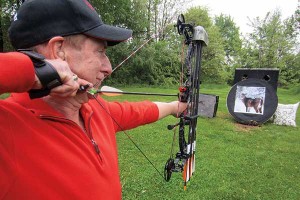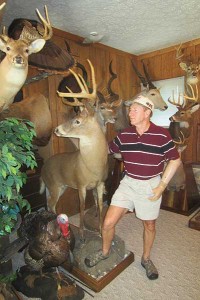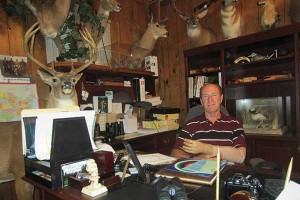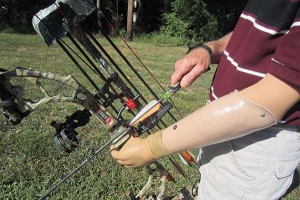December 03, 2013
By M.R. James
 "I still don't know exactly what happened. One minute I was steering my riding mower along the grassy bank beside our lake. And as I rounded the corner near the deep end, I distinctly recall a tiny voice cautioning me to be careful and not get too close to the water.
"I still don't know exactly what happened. One minute I was steering my riding mower along the grassy bank beside our lake. And as I rounded the corner near the deep end, I distinctly recall a tiny voice cautioning me to be careful and not get too close to the water.
The next thing I remember was looking up at sunshine reflecting on the lake's surface just above me as I kicked clear of my overturned mower and tried not to drown. I don't swim, but I didn't panic. Somehow I surfaced and splashed toward shore, reaching out to claw my way up onto the grassy bank. That's when I first noticed the blood and a white shard of splintered bone sticking out where my left hand used to be."
This was late Monday morning, July 18, 2011, another sweltering summer day in southern Indiana east of the Ohio riverside town of Newburgh. Not 24 hours earlier, Don and Jody Castrup had happily celebrated their 35th wedding anniversary.
Now, after a midmorning workout at an area health club, Jody was preparing to run some errands while Don mowed the tall grass and weeds sprouting around the shimmering lake located some 300 yards behind their suburban home. Daughter Katie would be dropping off her son Mitchell later that day so her oldest boy and G'pa Don could go fishing that evening. Catching fish was already a favorite pastime of Katie's active four year old, who was hooked on the outdoor sports so important to his dad and granddad.
Advertisement
Don, a serious bowhunter since the mid-1960s, had in 2007 wrapped up a three-and-a-half decades' long career as a "road warrior" sales manager for PSE.
That's when son-in-law Jon Lene', Katie's husband and Mitchell's dad, filled Don's boots by assuming that same demanding PSE field slot. But despite slowing down, Don had no retirement plans to sit back in a front porch rocking chair. The affable and likeable sales pro had stayed on for a time with PSE, teaching effective sales techniques to newly hired field reps.
He also launched his own sales company, representing a small but exclusive group of archery industry clients, bowing out only when that business placed too many demands on his leisure time. Ultimately, an offer to manage the sales and marketing duties for southern Indiana-based American Whitetail Targets proved the perfect fit, giving Don the freedom to hunt and spoil grandsons Mitchell and little brother Andrew.
Advertisement
Incidentally, BOWHUNTER readers with a long memory may recall Don's one-time stint as a columnist and occasional contributor for this magazine. Don also ran an archery shop and indoor shooting lanes in Evansville. And having successfully bowhunted the Dark Continent many times, he booked African hunts for adventurous clients and offered quality taxidermy services for successful Tri-State hunters in Kentucky, Illinois, and Indiana.
"My mind was pretty foggy. I instantly knew I was in big trouble and had to get help fast. Yet I wasted precious time fumbling with my cell phone, trying to call the house for help. When it dawned on me my phone had been fried by the lake water, my second thought was to try walking back to the house where Jody was.
Oddly, there was no pain in my mangled arm. But I could see I was losing lots of blood and knew I likely was going into shock. I wasn't sure I could make it, but I had to try. So I clamped hold of my upper left arm just under the armpit. Squeezing hard, I stumbled away toward home."
 Inside the house, Jody was still tinkering around her kitchen, blissfully unaware of the noon-hour nightmare unfolding only a few hundred yards away. It had been right around 11 a.m. when Don announced he was going to mow the lakeshore. His goal was to make it easier for him and Mitchell to get closer to the water without wading through knee-deep growth.
Inside the house, Jody was still tinkering around her kitchen, blissfully unaware of the noon-hour nightmare unfolding only a few hundred yards away. It had been right around 11 a.m. when Don announced he was going to mow the lakeshore. His goal was to make it easier for him and Mitchell to get closer to the water without wading through knee-deep growth.
And while Don fired up his old Snapper mower and putt-putted off to the back of the Castrup property, Jody was debating whether to pick up her car keys and drive to the bank and grocery store a few miles away.
"I came this close to being gone," she admitted later when telling her side of the story, raising her hand and holding a thumb and forefinger less than an inch apart. "But I finally thought, 'No, I'm not going to do that today.' So in the end, I decided to stay home and cook up a few things for dinner before Katie dropped Mitchell off."
Really, it was one of those everyday household decisions that no wife might ever guess would make the difference between her husband's life and death.
"When I finally reached the house, I walked past the side door under the carport that opens into my den. The den's carpeted, and I was still leaking a lot of blood. So I continued another 20 yards or so around to the patio door near our kitchen and dining room. That's where I figured Jody was most likely to be.
My mind kept going in and out of focus. When I banged on the door, Jody heard me and hurried to see what was wrong. I really didn't want her to see my mangled hand and bloody arm, which looked just horrible. One quick glance at Jody's face told me it was too late. 'I messed up,' I told her. 'Get something to tie this with and bring a towel.'"
Jody, in fact, had been on the kitchen phone confirming Don's afternoon dental appointment when she was startled by the loud banging on the patio door. "I looked out the window, screamed, and ran to the door. I didn't know what had happened to Don, but that one look told me what was terribly wrong.
And I knew it was bad-bad. So when Don told me to go get a tourniquet and a towel, I ran back through the house dialing 9-1-1 on my way to our upstairs closet. There I grabbed a belt and towel while the dispatcher assured me an ambulance was on its way. Then I raced back downstairs."
With Don seated in a patio chair under a boiling midday sun, Jody gently slipped the belt around his mangled arm and pulled it tight, using the towel to help staunch additional blood loss. As she worked, Don kept repeating, "I messed up. I really messed up."
Jody finally said, "It'll be all right. You can live without this arm, but I can't live without you."
At this point, having seen the devastating damage inflicted on Don's left hand and arm by the whirling mower blades, both Don and Jody believed there was little chance doctors could salvage much if any of the injured limb — his bow arm — below the elbow.
And with the massive blood loss, there was the nagging doubt whether EMTs could arrive in time to treat the injuries and rush Don to St. Mary's Trauma Center. That Evansville hospital was located some 10 to 12 long traffic-congested miles away.
While waiting, Jody anxiously dialed Katie to share the grim news of Don's accident. She also wanted to let their daughter know they'd soon be on the way to the hospital and to meet them there. But when son-in-law Jon answered the phone, Jon said he'd be right over while Katie stayed behind to call a neighborhood sitter who'd look after their boys. Jon arrived just before the ambulance rolled into view no more than 10 minutes after Jody's frantic 9-1-1 call.
When EMTs finished their on-site examination and basic treatment, the ambulance headed west towards Evansville with Don and Jody aboard. With Jon hurrying home to collect Katie and follow, Jody used her cell phone to call and break the news of Don's accident to older son Paul. Meanwhile, St. Mary's trauma doctors and nurses had been alerted by radio and were already prepping for Don's arrival.
"I never did lose consciousness, and there was no arm pain whatsoever until we were almost to St. Mary's. That's when the sucker really fired up. I was in instant agony and started begging the techs to put me out. All they said was, 'Stay with us. Stay with us.'"
"I don't know that he's going to make it, but we're going to do everything we can." These softly spoken words to Jody came as the Emergency Room surgeon leaned in close to her as they stood at the foot of Don's gurney just outside a Trauma Center operating room. Only minutes earlier, while ER staff worked over Don, a well-intentioned St. Mary's Hospital chaplain had tried to reassure Jody by saying that amazing surgical work could be done to restore damaged limbs and even reattach amputated arms, hands, and fingers.
"I didn't say so," Jody later commented, "but I was thinking to myself, 'You didn't see what I saw.' There's no way they're going to put Don's arm back together."
And now a surgeon had raised the specter of Don not making it through his upcoming surgery. Those sobering words were a true reality check that put everything about the seriousness of the accident in perfect perspective. As Jody fought back a growing sense of panic, Don suddenly spoke up. He'd not once lost consciousness through his entire ordeal and his words sounded to Jody like an actor reciting lines from a bad movie "Don't BS me, Doc. Am I going to make it or not?"
The surgeon turned toward Don. "Well, you might not," he said honestly. "But we're going to do all we can do."
"You'll make it!" Jody insisted. "Yesterday, at our 35th anniversary celebration, you promised me at least another 25 years together. I'm going to hold you to it."
"Doctors later told me I'd lost three-fourths of my blood. They said I received eight pints immediately, and that was on top of the fluids I got on the way to the hospital. Another two pints were given for a total of 10. That's about the same amount most adults have in their bodies. My transfusions were kind of like getting a complete oil change — without the filter. From a bowhunter's perspective, I'm amazed I made it 300 yards to the house without bleeding out. I've never had a hard-hit deer go so far after losing that much blood."
 Hemorrhaging wasn't Don's only immediate problem. Follow-up treatment to a previous heart bypass operation included a daily dose of Plavix, the blood-thinning medication that prevents clotting. Heart patients taking blood-thinners commonly stop using such drugs five or more days before a scheduled surgery.
Hemorrhaging wasn't Don's only immediate problem. Follow-up treatment to a previous heart bypass operation included a daily dose of Plavix, the blood-thinning medication that prevents clotting. Heart patients taking blood-thinners commonly stop using such drugs five or more days before a scheduled surgery.
Obviously, Don's emergency situation presented a real challenge for the St. Mary's medical team. But since Jody had alerted doctors to Don's medications, preventative steps were taken to control excessive bleeding during repair work on his mangled arm. In the end, despite potential problems, the surgery was successful. After a five-day stay in St. Mary's, Don was allowed to go home and begin picking up the pieces of a life nearly lost.
"We were truly overwhelmed by the support we received," Jody said. "It started with the sensitive, caring doctors and nurses at St. Mary's. But as word of Don's accident spread, we began getting lots of get-well cards and e-mails from Hoosier friends and neighbors, bowhunters, archery company manufacturers, distributors, and other of Don's industry friends and clients. Later, the folks helping fit Don with a prosthetic arm were equally concerned and helpful. For us, it was a truly humbling experience.
"A few asked if Don was depressed, and I truthfully replied, 'No. Not at all.' Don's always had a positive attitude and a strong belief in God. We went to church as usual the Sunday after his Monday accident. He's not one to sit home and hide or brood or ask 'Why me, Lord?' This was a man-caused mistake.
In fact, we feel God's hand helped save Don. There's no doubt He helped Don, injured and unable to swim, out of the deep end of our lake. He kept Don calm and gave him the strength to somehow walk 300 yards back to the house. He also told me to stay home instead of going shopping, and to be strong enough to fight off hysteria while doing what I needed to do. And, He even was at the Trauma Center, where the surgeons used a newly tested and approved transfusion procedure to get the lifesaving blood flowing through Don's veins."
Once the threat of infection passed and the healing had begun, Don started the long physical therapy process. The emphasis was on building strength and flexibility in the remaining portion of Don's left arm. Pain of both the real and phantom variety was a constant companion. "I felt and still feel like my arm's still there," Don admits. He also noticed a growing ache to get back into the woods, first as a hunting camp companion and later as the bowhunter he's been for nearly 50 years.
And only 90 days after the devastating injury, Don was in a hunting camp with friends once again. Although he couldn't bowhunt, just being there was good medicine for this hunter's soul.
"I've always pushed the envelope in everything I do. The accident and loss of my arm slowed me down, but it hasn't really bothered me because I know I can deal with it. When it happened, I was calm and resigned to the fact I was probably going to die.
Although I'm not afraid of death, I was bothered by the gut-wrenching knowledge that Jody was watching me die, and I was about to lose being with her and our kids and grandkids and other family members. Being given a second chance is a gift that makes me better appreciate what blessings I have. It also reminds me to not waste a single day and thank God for whatever time I have left."
Feeling His Way
Don's personal experience with prosthetic limbs has been an emotional roller coaster ride. After his surgically repaired amputation healed sufficiently to withstand the pressure of being fitted with an artificial arm, Don eagerly took the first step toward being able to once again pick up, hold, draw, and shoot a hunting bow.
His first early model prosthesis had its roots in World War II and was tipped with moveable stainless-steel grips. But with the injuries suffered by soldiers more recently in the Iraq and Afghanistan wars, there have been amazing advances in modern prosthetic legs, arms, and hands.
 Subsequent models Don tried were much more advanced. Metal grippers were replaced by a more realistic-looking hand, and an arm that fitted over a cloth sleeve slipped onto Don's arm stump.
Subsequent models Don tried were much more advanced. Metal grippers were replaced by a more realistic-looking hand, and an arm that fitted over a cloth sleeve slipped onto Don's arm stump.
Electrodes in the sleeve and limb allow a wearer to reach, pick up, and hold items in much the same fashion as a real arm and hand. Don eagerly set out to get used to wearing and mastering the artificial limb.
Early efforts were admittedly frustrating and disappointing, but technical tweaking and experimenting with several different prosthetic models saw gradual improvements in performance and results. Don noted that at first the pressure on his arm made trying to shoot a bow downright uncomfortable.
But with time, he could grasp and raise his bow into shooting position. Regardless, drawing even a light-pulling bow was no easy matter, but Don's persistence paid dividends. In time he was able to repeatedly draw, hold on the target, and release an arrow.
Several of the photos accompanying this article were snapped at Don's backyard practice range during shooting sessions earlier in 2013. He admits he's still building up his strength and honing his accuracy while preparing to resume bowhunting. "It's not going as fast as I'd hoped, but I'm persistent and I can tell that I'm making progress. My initial goal was to be able to bowhunt this deer season, but if I'm not ready, that's okay. I'll be out in the woods again as soon as I can, and when it happens, it'll be extra special."
Anyone who knows Don Castrup isn't about to bet against him — or doubt that what he says is exactly what he means.

